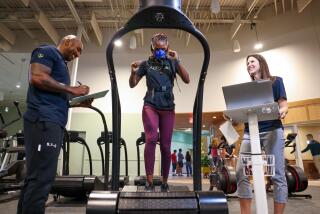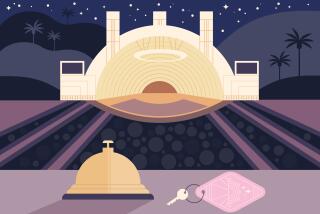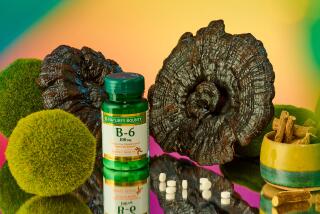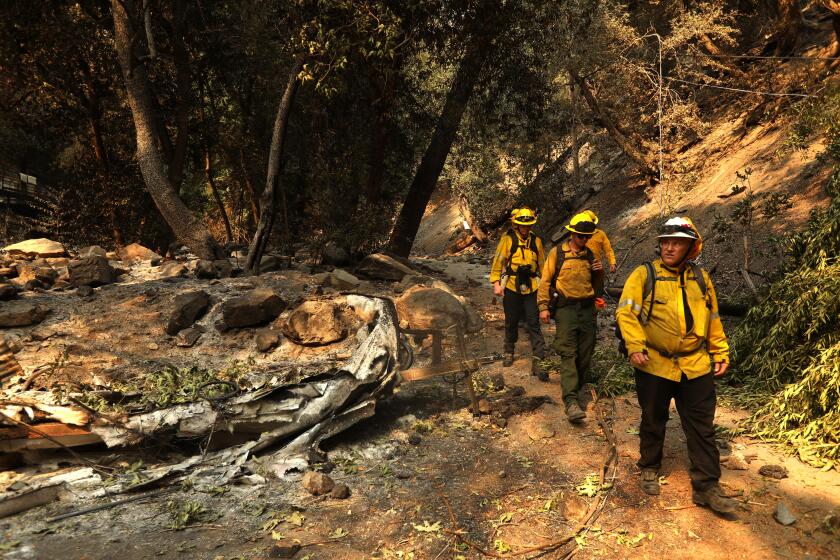At Westlake Village Four Seasons, luxury spa meets medical clinic
I’ve discovered rehab lite.
And like the motley crew of fallen politicians, overdosing rock stars and careening actors, I’m a better person for having checked in — to a hotel.
With the promise of helping its guests conquer bad habits and illness in sumptuous luxury, the new Four Seasons Hotel in Westlake Village offers a kind of halfway house for those of us who don’t need (or want) full-time therapy, inpatient rehabilitation or personal trainers. Instead, you can get a mind and body tuneup or even an overhaul with help from pros — and then order room service.
Check in and you can bound from a stress reduction workshop to your cheery, chinoiserie-accented room, or apply your personal trainer’s tips in the state-of-the-art fitness center. Perhaps you’ll soak in your marble bathroom’s oversize tub while reviewing the lessons of your self-improvement therapy or use the nutritionist’s advice to select from the spa-like menu at the hotel’s fine-dining restaurant, Hampton’s.
What, you may wonder, is a hotel doing in the medicine and psychology business? It was inspired by the philosophy of its health-convert founder David H. Murdock, the billionaire real estate tycoon and owner of Dole Food Co., with backing from WellPoint Inc., one of the nation’s largest health insurance companies.
With an eye toward making the complex a pioneer in physical and mental health, Murdock has established the California WellBeing Institute, an on-site clinic that can teach you about nutrition, stress management, fitness and even how to stir-fry fish. The California Health and Longevity Institute is an independent, in-house medical clinic that has on-site, on-staff physicians as well as visiting physicians. They don’t perform invasive surgeries but can write prescriptions, diagnose and give injections, including those for cosmetic purposes. And you can valet park.
The hotel is within pineapple-tossing distance of Dole’s headquarters and has 270 large rooms and suites stocked with amenities — flat-screen TVs, DVD players, embroidered cloth laundry bags. For leisure and business travelers, there’s a welcome abundance of lighting, writing surfaces and seating, plus a firm but pillowy mattress tucked into 425 square feet. Under one roof, you can buy Wolford hosiery, eat sushi on Limoges at Onyx, the Japanese restaurant, and visit clinics that dispense therapeutic advice, diagnostics and noninvasive treatments, all an elevator ride from the pool and spa.
The programs aren’t just some squishy, feel-good talk: The WellBeing center can map your DNA and chart preventive programs aimed at ailments lurking in your cells. So while you’re coddled, you can confront the bad news about the effects of aging, your lifestyle and your habit of starting the day with coffee and Baileys Irish Cream.
Given our culture’s history of embracing quick cures, I approached the hotel and its programs with trepidation. Would this be a kooky “Road to Wellville West”? Nope. The WellBeing institute employed seasoned, credentialed experts who delivered practical insights to help achieve long-term change. I even got a thank you card, reminding me to take my vitamins.
Unlike strict residential spa programs that feel like volunteer kidnapping or indulgent getaways that feature hangovers and heartburn, Murdock’s retreat aims to help you live long and prosper. Toward that goal, I signed up for an introductory package that offered a two-night stay in a $375 room, and $100 off the $450 Life Taste program, a four-hour overview of my fitness, nutrition and mental health.
Within minutes of my first workshop session, “Building an Immunity to Stress,” the irony hit me. I wondered aloud to my “life advisor,” a licensed clinical psychologist: “How bad can life be if I’m at the Four Seasons?”
Not bad at all, actually. Given the four hours of counseling with advisors, a certified nutritionist and a personal trainer, I got good advice, and for $350, a decent deal on professional services.
The hotel, with its luxury lure, makes tackling some of life’s unpleasant issues easier. Yet the concept also illustrates that the best healthcare is now the prerogative of the rich: They can pay to hear how to better live the good life, while the rest of us save articles from Prevention magazine.
I was expecting something more severe from the programs, given the hotel’s uninspiring exterior and location. Driving up to the 20-acre grounds, I thought I had arrived at an office park in Dallas. The exterior looks institutional, yet the interior concept is multi-layered: This is a luxury medi-hotel that weaves holistic self-care principles with the passive pampering of an upscale resort spa, minus the sanctimonious baloney. There’s a large Euro-Asian spa, gorgeous and dense with orchids and fluffy white robes.
And every menu in the two restaurants, lounge, bar and cafe is designed to tempt you with healthful foods. They take portion control seriously here, so don’t panic if you mistake your salad for garnish.
By contrast, the complex is huge. There’s a Chinese pagoda for meditating, an orchid greenhouse, a TV studio with a 7,000-square-foot soundstage, a play area for kids and teens and a twinkly chandeliered ballroom. The complex is a massive undertaking that needs time to work out its kinks.
Unfortunately, far too many aspects of the then-6-week-old hotel’s service were awkward and irritating, unraveling the relaxation goals of my stress-management program. It didn’t help that I was evacuated at 2 a.m. because of a false fire alarm. Few hotel staffers anticipated needs, and most were clueless about solving small problems. I could have squandered the lessons of my newfound peace and complained about slow room service, scratchy sheets, missing Evian water and botched hotel restaurant reservations.
But, hey, I was at the Four Seasons, with a personal life advisor who stepped in to fix glitches. How bad could it be?
Yet the most successful part of the hotel seems to be ... the billiard room and bar. (All the snacks are, of course, healthful, such as shrimp cocktail and hummus with baked pita chips.) As perhaps the newest sophisticated bar in the Conejo Valley, it has become the fortysomethings’ cruising spot. I met executives on layover, a rock concert promoter and an Alabama- born electrician whose belt buckle was emblazoned with the word “HICK.”
They already had a firm grasp of one of the self-care principles I was trying to learn: Be good to yourself.
Bartender, I’ll have the Champagne.
valli.herman@latimes.com
More to Read
Sign up for The Wild
We’ll help you find the best places to hike, bike and run, as well as the perfect silent spots for meditation and yoga.
You may occasionally receive promotional content from the Los Angeles Times.






